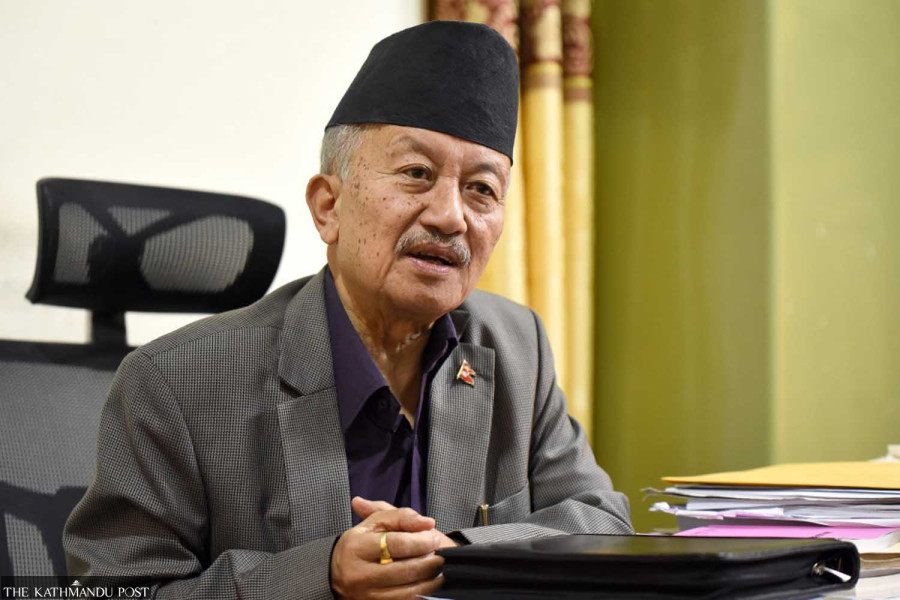National
Nembang’s absence adds to transitional justice worries
Lawmakers on the House panel say the former Speaker had been instrumental in finalising the amendment bill.
Binod Ghimire
After failed attempts to endorse the bill to amend the Enforced Disappearances Enquiry, Truth and Reconciliation Commission Act last year, the ruling alliance has been reaching out to the main opposition to get it endorsed at the earliest.
Ever since the registration of the bill in the House of Representatives in March last year, the CPN (Maoist Centre) and senior partner in the ruling alliance Nepali Congress have been holding a series of dialogue with the CPN-UML at different levels. While prime minister and Maoist Centre chair Pushpa Kamal Dahal and Congress president Sher Bahadur Deuba had been reaching out to KP Sharma Oli, the UML chair, the second-rung leaders had been engaging with the UML’s second-tier leadership.
Subas Chandra Nembang, the UML vice-chair and former chair of the Constituent Assembly, was among the prominent leaders they had been engaging.
When the bill landed in the Law and Human Rights Committee of the House of Representatives, it was Nembang who was the focal person to engage for the ruling parties. The House committee then constituted a sub-committee to narrow down differences among the parties, with Nembang and Mahesh Bartaula from the UML, Ramesh Lekhak and Jeevan Pariyar from the Congress as its members. Though not its member, Barsha Man Pun had been in the negotiations from the Maoist Centre.
Though Dhruba Bahadur Pradhan, a Rastriya Prajatantra Party lawmaker, has been leading the sub-committee as the senior-most lawmaker by age, it was Nembang and Lekhak who played decisive roles in the sub-committee and the full committee.
“As he [Nembang] had extensive knowledge on transitional justice and human rights, he was the driving force behind our efforts,” Bartaula, who also is a UML whip, told the Post. In an interview with the Post two weeks back, Lekhak, a Congress chief whip, said Nembang had been instrumental in finalising the bill.
“We [the ruling and opposition] parties in the sub-committee are very close to an agreement. The bill will be submitted to the House committee after the cross-party top leadership goes through it once,” he had told the Post. Having served in several ministerial roles, thrice as Speaker including twice as chair of the Constituent Assembly, Nembang wanted to add another feather in his cap by playing an instrumental role in concluding the transitional justice process, the last goal of the peace process.
Having a law in line with Nepal's international obligations on human rights and the Supreme Court’s verdict of 2015 is a prerequisite to conclude the transitional justice process.
Of late, Nembang had been claiming that it was possible to conclude the transitional justice process using Nepal’s home-grown approach. The Rastriya Swatantra Party chief whip Santosh Pariyar, who also is a member of the sub-committee, said they had sorted out almost all differences on the bill and they were planning to send it to the House committee by this week after giving it a final shape.
After a series of negotiations, the sub-panel has agreed to constitute a separate bench in the Supreme Court to decide insurgency-era cases, list all murders (killings) as serious human rights violations and provide compensation to child combatants.
Lawmakers representing different parties in the sub-committee have agreed to give four more years to the two commissions to complete their job and own up all complaints including those registered in the human rights committee of the United Nations and the National Human Rights Commission, among others. Nembang was playing a lead role in the process, according to committee members.
A few months ago, a team of cross-party leaders led by Nembang had visited Colombia under his leadership to study the South American nation’s successful transitional justice model. UML leaders say he returned confident that Nepal could conclude its transitional justice process, which was also vital to stop the country from getting a bad name in the international stage.
Not everyone appreciated his role. Even within the UML, a section feels Nembang was more liberal towards the Congress and the Maoist Centre, both warring parties, in the transitional justice process. “However, he had the ability to convince the leadership logically, which is why he was a focal person from the party in the transitional justice negotiations,” a UML lawmaker said.
“He [Nembang] played a leading role in sorting out the differences,” RSP’s Pariyar told the Post. After Nembang's demise on Tuesday, there is a confusion about the bill’s future. “With Nembang gone, I am not sure what will happen to the bill since he was the one with the ability to convince cross-party leaders,” said Pariyar.




 13.12°C Kathmandu
13.12°C Kathmandu














